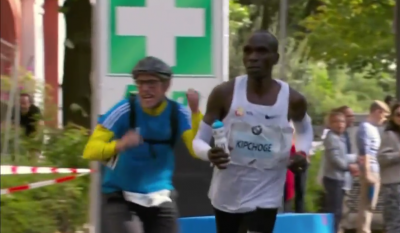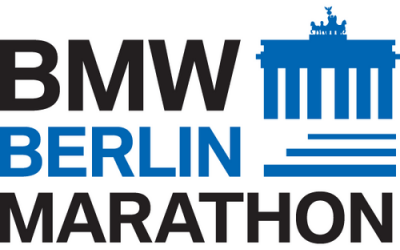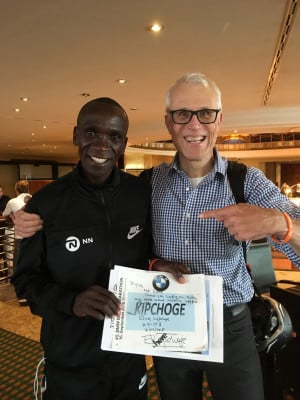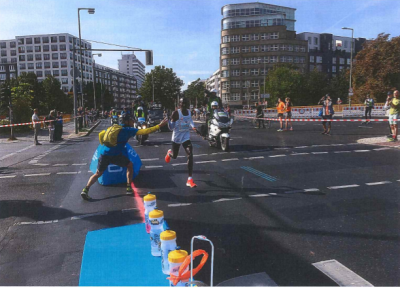Meet “Drinks Guy,” the Fist-Pumping German Who Gave Eliud Kipchoge His Drinks During His World Record Marathon
By Jonathan Gault
September 17, 2018
Yesterday, like most of the world, I watched with awe as Eliud Kipchoge ran 2:01:39 at the Berlin Marathon to break the world record by 78 seconds. Because the early stages of a paced marathon, even one like Berlin, are often fairly formulaic, I like to occasionally share some of my lighter observations about the race on my Twitter feed before really focusing in during the second half. Watching Berlin, I was struck by the enthusiasm of the gentleman handing Kipchoge his drinks.
The first time I saw it happen, I smiled: Kipchoge completed a successful handoff and the volunteer pumped his fist at a job well-done. Then the same volunteer did it again. The third time he did it, I had to rewind the broadcast: the clip was too good not to share. I fired off a tweet, not thinking much of it.
Wish everyone had the same passion as Drinks Guy pic.twitter.com/dtTrIGgPha
— Jonathan Gault (@jgault13) September 16, 2018
One day later the video has been viewed over 100,000 times. As I sat at home on my couch watching football yesterday afternoon, my phone pinged with notification after notification. The overwhelming majority of responses were positive.
People loved Drinks Guy. There was something about him that resonated: the way he brought passion and enthusiasm to even the smallest job, his earnest celebration of a job well done, the way that a normal person could be a small part of a historic achievement.
I don’t want to make Drinks Guy out to be more than he is. The memorable performance from yesterday was Kipchoge’s — 2:01:39 is a record that will stand for many, many years. You can even debate whether Drinks Guy needed to be there at all — in many marathons, elites will simply grab their drinks from a table (though as we saw with Mo Farah at this year’s London Marathon, that doesn’t always work). But his enthusiasm, and the internet’s shockingly snark-free reaction to it, made me want to find out more about the guy.
***
Turns out Drinks Guy is actually an excitable 52-year-old amateur triathlete from Berlin named Claus-Henning Schulke. In his day job, Schulke works as a project manager working on the €60 million reconstruction of the Berliner Schloss (or Berlin Palace). He’s been volunteering at the Berlin Marathon since 1998 and is now the senior member of the 30-person crew in charge of getting the elite athletes their drinks during the race.
When I spoke to him on Monday, he began the call by apologizing for his voice — his throat was still aching after screaming for Kipchoge on Sunday. What follows is a transcript of our conversation, edited for clarity.
JG: Why did you decide to sign up as a volunteer back in 1998?
CHS: The manager of the Berlin Marathon was in a swimming club and he was looking for volunteers. And I’m a triathlete and he asked the triathletes swimming in his group to volunteer. My hand got up and I was excited to do it. [It] was the right decision to do it. Every year, it’s really exciting to give something back to this event and it’s always incredible to help there.
What do you like most about it?
The biggest challenge is to hand the right bottle to the right athlete. Because there are sometimes 20 athletes running to you and you have to pick your athlete and give them the right bottle.
Was there a process for determining who gets to hand which runners which drinks? How did you end up being the person for Eliud yesterday?
Because I have the most [experience] in this job. Last year the manager of the Berlin Marathon asked me to meet Eliud and his manager on Thursday before the start. And because I did an excellent job last year, they asked me again for this year. We had a pre-race meeting with Eliud and Valentijn [Trouw], which is his manager. We were kidding a bit and we were discussing about the best handling. So it came to me to support him this year again.
Did Eliud and Valentijn give you any special instructions?
How to hold the bottle in the hand so he can grab it the best way. I hold the bottle on the bottom so he can pick it up with his whole hand on the [side].
Did you follow the same process in years past? Because I’ve watched a lot of marathons, and often the elites just grab the drinks right from the table, and not from the volunteers’ hands. I’m curious, had you done that before? Why did you have the drink come right from your hand as opposed to from a table?
We experienced a lot and like to improve the nutrition for the athletes. The Berlin Marathon is in the [World Marathon Majors] and we want to do a special service. The best service so the athletes can focus only just on running. In some occasions, the athletes try to grab it from the table, he misses it. And the chance to get the bottle is much higher if you hand it out by hand.
How long have you been handing it out by hand? Is that always what you’ve done in Berlin?
Yes, I have never seen it another way. It’s just for the “A” athletes. We have seen the “B” athletes which don’t have this service. And if they have to grab the bottle they prepared the morning in the hotel, he has to find it on the table within maybe 20 other bottles. And it’s hard to find it if you run a pace of about 20 kilometers an hour, to really to grab it and get it out of these bunch of other bottles.
It’s much easier to get it if you [have a volunteer]. What we do is shout at the athletes so he knows it’s his bottle. The bottles are marked with a name, with his number, and we shout as loud as we can so he knows that you are his volunteer.
How many “A” athletes are there?
We have about 30. So we have volunteers and 30 “A” athletes, about 10 women and 20 men.
Are you a fan of running? Do you follow running and marathons the rest of the year apart from Berlin?
I follow in Berlin, I follow all the marathons. When I was 19, I did marathon very intensively. My best was 2:34, then I changed to triathlon and now my focus is more on triathlon than on marathon.
And on TV, will you watch the London Marathon, will you watch Boston?
Oh yes, yes, yes. I like to watch London and New York and Boston. These are my favorites, and the Olympics.
So who is your favorite runner?
[laughs]
Guess.
It’s Eliud, no question.
He set a world record that will likely last for many, many years. What was it like to be a part of it?
It’s incredible. Each year I’m very nervous as the marathon is coming closer. And I try to figure out what can we do better, what can we improve? And this year was the first time when we had a sign on the [arms of the volunteers] with the name of the athlete so he can see on the arm his name and know this is the bottle.
 Which stations were you at during the race?
Which stations were you at during the race?
This year, we have stations at 5k, 10k, 15k. These are the 5-kilometer gaps. And from 15k on, we have 2.5-kilometer gaps. So we had this year in Berlin, 13 stations where the athletes can be supported. And Eliud did each station, but not all athletes do it, some just doing eight stations or less. But our job is to go from station to station by bike, put the bike on the side, take the bottle, which is prepared by the athletes in the morning in the hotel, and pass him this bottle. After we pass the bottle, we have to pass the cameras, the runners [on our bikes] to get to the next station.
Do you get nervous when you’re biking between the stations?
Oh yes, very very. Because we don’t want to be too late at the stations. The athletes are running about 20 kilometer [per hour] pace or 21 kilometer [per hour] pace and you have to hurry to be on right time at the next station. And you have to find the right bottle and you have to prepare. And [then] there are about 30 seconds when the athletes are coming. So it’s all very exciting and you have to hurry a lot.
Were there any problems yesterday?
Yes. On one station, he did not see me because the spectators, they hide me. Eliud could not see me because I was hidden behind the spectators. On that station, it was kilometer 40, he missed my bottle. But there was a regular station where he can drink water, so it was not too much trouble.
And did he get a bottle at every other station? That was the only problem?
On one station, he was too far away from the table and he also missed another station, but his manager told me it was not a problem. Because he has a very narrow [gap between stations], a 2.5 km gap. When he was in Monza, I think, was the first time he tried this very narrow [gap between] stations and he decided to transfer it to the real city marathons.
One thing that I found terrific and our readers also very much liked was that you were very enthusiastic. You would pump your fist when you handed off the bottles successfully. Why did you do that, where does that come from?
Because you are not sure if he really sees you, if he really gets the bottle. And I wanted to be a part of his record. And if anything failed, it would be horrible for me because it could be my fault that he could not do his best. So I was really always excited and happy that it worked properly. And he is also a really nice guy and I wanted to help him to do his best. He should focus on the running, and I wanted to do the best to support him in this.
I saw on Instagram that you met Kipchoge, he signed something for you today? What was it like meeting him and talking to him today?
It’s great. He’s a really, really nice person. And the gesture to say thank you for passing me the bottle — I’m the bottle handler! — it was a really nice and warm gesture of him. In my eyes, he rises with this gesture.
Did he say anything to you that was memorable? What did he say specifically?
He was passing me his [bib] number. He [wrote on the bib], “Mr. Klaus [sic], thank you for helping me today. My world record wouldn’t happen without you.”
It was really grabbing my heart and it was really warm. It was a really nice gesture.
During the race, I was watching it and I recorded a quick video of one your celebrations after handing it off, and many of my followers on Twitter, they liked the video very much. I’m wondering if you have anything to say to them, the people who enjoyed watching you?
I’m really, really surprised that my gesture came into the public because it was just an inner gesture for me, that I was really happy that everything runs properly. So I’m really surprised that anyone else saw this gesture, that the camera [saw] it. It was really not for public, it was really just for me. I can’t say anything to them, but I was so close to the world record holder. And it was a fantastic feeling. It was maybe almost overwhelming. This was a gesture I just did for myself.
Is there anything else that is important or interesting I should know?
I think the world record is a puzzle of a lot of different people. Maybe it is 90% Eliud, it’s nearly 10% the coach, and it’s maybe 1% of Claus of Berlin, who could help Eliud to do this excellent time and to get the world record.
But next year, we will improve in some details and I know, I’ve just talked to the manager of the Berlin Marathon, and we can maybe do maybe another surprise.
You don’t want to say what that is just yet?
No, no, no. [laughs]
On the aid stations, we like to improve something better and let’s see if it works and maybe we can also improve some seconds so the athletes have it a little easier to concentrate on their skills, on their running.










